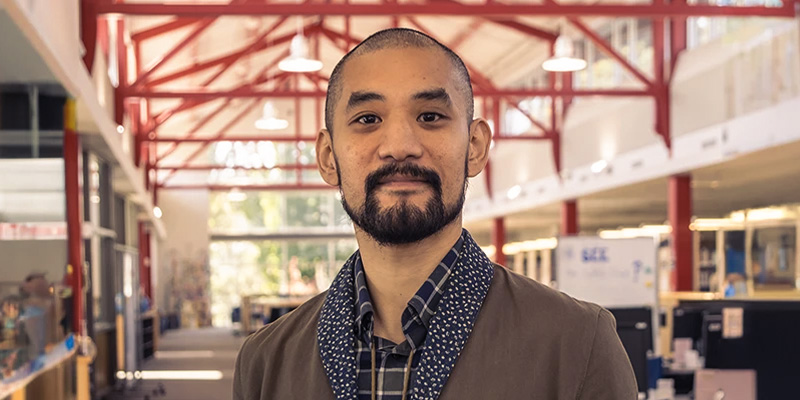Di Zhang joined Renton Technical College in February 2021 after nearly 10 years with the Seattle Public Library. Di is a world-renowned misinformation expert featured in Vox, Geekwire, and the Seattle Times. At RTC, he teaches tailored workshops to students, faculty, and staff, and designs and leads the library’s instruction program. We sat down with Di to learn more.
You have a background in information literacy and combatting misinformation. What about those fields interests you? Was there a moment when you knew you had to focus your career on those fields?
The moment was the end of the 2016 presidential election, when I was an adult services librarian at The Seattle Public Library. The public was asking a lot about news stories they saw on Facebook, and fake news as a term had just been coined. We realized that information literacy skills would be very useful, and I designed a workshop called "The Fake News Survival Guide." I learned through that process that I love teaching, and I'm passionate about fighting misinformation.
What can people do to avoid misinformation?
There's a lot that they can do. I like using the SIFT method developed by Mike Caulfield, which stands for Stop, Investigate the Source, Find better coverage, and Trace back to the original source. Here's a video I created demonstrating this method.
I also believe it is important to seek opposing opinions before taking a stance because humans are very prone to bias. This is especially true on the internet where those biases are reflected back to us via social media and search engines. This is also known as filter bubbles.
If someone you know is spreading misinformation, what’s the best way to handle it?
I advocate taking a curious approach. Don't bring them information or counter-arguments right away. Understand their concerns, where they got their information, and why they believe it. I believe trust and empathy are precursors to changing someone's mind. And we also have to accept the possibility that no amount of evidence can convince them they are wrong.
Misinformation has become more prolific through the internet and social media sites. What do you think the future looks like? Do you have reason to be optimistic?
The future has many possibilities. For example, the growing threat of deepfakes, which are synthetic media that use artificial intelligence to take someone's likeness and make them appear to do or say things they did not do, is something that must be addressed. There's also now a record low trust in the media, causing many to turn to alternate forms of information that are not fact-checked. As a parent, I worry about the impact of social media on the mental health of young people.
That said, there are reasons to be optimistic. Jurisdictions from California to the European Union have passed laws protecting online consumer privacy and limiting the amount and types of data they can collect on people. There are several pieces of legislation that have been passed in the states supporting media literacy education as well, including our own Washington State, which passed funding to support media literacy education. Many people are realizing the influence of big tech on their lives and choosing to abstain or limit their consumption. As educators and community members, we can have conversations and advocacy about how to use our digital tools safely and responsibly, and that gives me a lot of hope.
What resources does the RTC library offer to combat misinformation?
We have our fake news playlist that addresses different aspects of information literacy, as well as a resource guide on fake news. Also, librarians are trained specialists in finding, using, checking, and disseminating information, so always feel free to reach out with questions about the credibility of information!
Visit our Media Literacy Guide to learn about events we are hosting during Media Literacy Week (October 24–28) as well as resources for combatting misinformation.
What’s something great about the RTC library that most people don’t know?
In addition to educational resources, we also provide spaces, equipment, and technology for students to be successful. For example, we are now checking out laptops for students who need them to do their coursework during the quarter. Stop by the Library in Building C to learn about all that we offer!
What’s your favorite thing about RTC?
I love how much I have been able to collaborate with other departments and contribute my skills and expertise to the greater goal of student success. From professional development opportunities to shared governance to hiring committees, there are so many different projects to get involved with and so many great people to work with!
